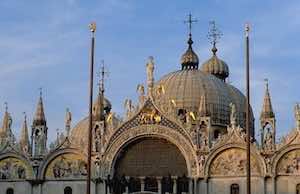Top > Other Musicians > Venetian School
This site introduces unknown composer Emanuel Bach (C. P. E. Bach). This English version was translated from Japanese one by ChatGPT.
Venetian School
The Venetian School refers to a group of composers active primarily in 18th-century Venice, Italy. This school made significant contributions to both vocal and instrumental music, playing a unique role during the transition from Baroque to Classical music. Below is an explanation of its characteristics and prominent composers.

Characteristics of the Venetian School
-
Elegance and Clarity of Melody
Music from the Venetian School emphasized melodic beauty and emotional expression over complex counterpoint. This trait later contributed to the foundational styles of Classical music. -
Flexibility in Harmony
Harmonic progressions were more natural and used to complement emotional expression, resulting in a more accessible musical style compared to that of other regions at the time. -
Dramatic Expression
In opera, emotional expression and dramatic intensity were emphasized, influencing the development of opera seria and opera buffa throughout Italy. -
Advancement of Instrumental Music
The Venetian School contributed to the development of concertos and sonata forms, with particular attention to chamber music and harpsichord sonatas.
Representative Composers
Baldassare Galuppi (1706–1785)
- One of the central figures of the Venetian School, renowned as an opera composer.
- Development of Opera Buffa
He made significant contributions to comic opera (opera buffa), notably through collaborations with librettist Carlo Goldoni. - Instrumental Works
Galuppi composed numerous sonatas for keyboard instruments, showcasing a clear style influenced by Domenico Scarlatti but with his own distinct expression.
Antonio Vivaldi (1678–1741)
- Though technically from an earlier generation than the Venetian School, Vivaldi’s music laid its foundational groundwork.
- Establishment of the Concerto Form
He is famous for his violin concertos, including *The Four Seasons*, which greatly influenced the instrumental music of the Venetian School.
Tomaso Albinoni (1671–1751)
- Best known for his vocal works but also produced outstanding instrumental music.
- Bridge Between Opera and Concertos
Albinoni’s works, rich in elegance and lyricism, exemplify the typical style of the Venetian School.
Benedetto Marcello (1686–1739)
- Marcello composed numerous sacred and instrumental works, representing the religious aspect of the Venetian School.
- *Estro poetico-armonico* (“The Harmonious Poetic Inspiration”)
His works are noted for their lyrical qualities and deep religious sentiment.
Influence
The Venetian Schoolʼs melodic style had a profound impact on the Viennese Classical composers, particularly Haydn and Mozart. In theatrical music, its contributions to the development of opera buffa extended beyond Italy, influencing the broader European musical landscape.
Composers like Galuppi helped popularize the works of the Venetian School, playing a vital role in foreshadowing the refined expression of the Empfindsamer Stil and Classical music.